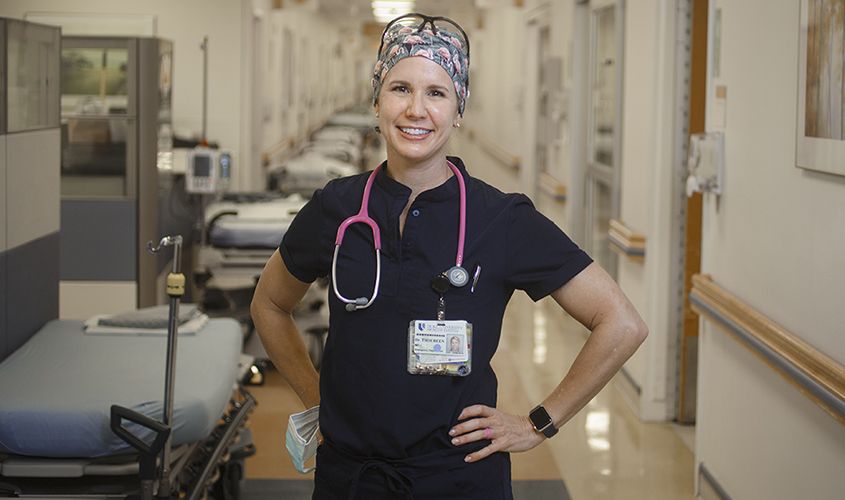
Before emergency medicine physicians face the myriad of cases that may come through the door on any given day, they will have practiced—over and over—the techniques and procedures needed to provide quality care with great efficiency. Some of the training occurs in a simulation lab, where practice can save critical minutes and even seconds when they’re needed most.
SGU News caught up with Traci Thoureen, MD ’98, the director of simulation and associate professor in the Division of Emergency Medicine at Duke University Medical Center in North Carolina, to learn more about the role that simulation plays at Duke, and how it was especially important at the onset of the COVID-19 pandemic.
St. George’s University: What is simulation and how important has it become in the training of emergency medicine residents?
Dr. Traci Thoureen: Simulation is one technique that we use in educating our medical school students and residents, as well as to provide context for attending physicians. It’s become paramount to add this live training to our department—such as procedural training, seeing rare cases, and also for team training and leadership. The sim lab allows us to have a safe learning environment that is incredible for practice and evaluation.
SGU: In addition to practical training, what intangible skills can be taught in the simulation lab?
Dr. Thoureen: In the emergency department, most of our day is spent working as a team—with nursing, techs, consultant residents, and/or attendings. We work in teams certainly for our trauma activations, as well as our sick medical patients and resuscitations. This is a skill starting from the first year that our residents are learning, and simulation allows them to practice their roles and the techniques that work well in those roles. Communication is a skill that we don’t often get to take a look at and with simulated scenarios, we really slice and dice it out to improve it.
“Simulation is one of the few ways that we can teach in a safe way yet get a visceral reaction.”
SGU: How and why did simulation become your career path, and what do you enjoy most about it?
Dr. Thoureen: I’ve been doing academic emergency medicine since I finished residency, and I’ve been lucky enough to have great mentors. I was able to learn from some of the best in simulation at Harvard’s Center for Medical Simulation in 2004 and that started my interest and passion for it. I really enjoy being creative in developing new cases and thinking about all the ways to make it more real. Simulation is one of the few ways that we can teach in a safe way yet get a visceral reaction. Also, I really enjoy trying out other educational technologies and seeing how they could fit into curriculum.
SGU: In what ways did simulation scenarios assist with addressing the COVID-19 pandemic?
Dr. Thoureen: We were able to set up a simulated airway area within our emergency department. We first got the attending staff onboarded with the equipment that we were going to be using for addressing intubations with COVID patients. Because of the success and safety we had with that, we extended that to our second- and third-year residents. We were able to see the ins and outs of the equipment on a manikin before having to use it on an actual patient.
SGU: How did the department adjust for online education in the early stages of the pandemic?
Dr. Thoureen: I teach a course to our first-year medical students, “Body and Disease.” It covers pathophysiology, immunology, and pharmacology, and we do four cases over three months. With COVID, I had to rethink and rework how to do simulation patient activity without a simulator. It was an abrupt change, but we were able to creatively mirror the experience virtually. Through Laerdal, one of the main manufacturers of human patient high-fidelity simulators, we could pipe in software and display a patient monitor that could show the effect of vital sign changes, and incorporate other aspects of the case with other instructors who would represent the patient, a nurse, or a family member. In our residency, we transitioned to Zoom conference. It became a wonderful way to incorporate national speakers and alumni to our education, as well as to do creative activities like using Zoom breakout rooms for gamification activities.
SGU: You co-authored the book Emergency Medicine Simulation Workbook: A Tool for Bringing the Curriculum to Life. The second edition comes out next year. What can readers expect to see in the book?
Dr. Thoureen: One of the frustrations that people have with new technology is that they feel like they don’t even know where to start. This is meant to be a catch-all book for novices and seasoned educators alike when it comes to simulation, specifically EM simulation. It can appeal to not only physician groups but nursing groups, RTs, and EMS. It’s broken down from nuts and bolts, to educational objectives, to all the things that you need to run a case. There’s also an online component, with images and labs for each case so that you have everything you need to run a case or a whole EM simulation curriculum.
SGU: How would you describe your St. George’s University experience?
Dr. Thoureen: I have really fond memories of my time at St. George’s. I made great friendships and bonds, and I felt like it was the time where I got to really try my best and move everything forward in my career. Medical school was a period where there were a lot of transitions, but they have served me well in my residency training and going forth in my now 18 years in practice in academic medicine. It’s been really fun for me to read about the expansion of education at SGU and to see SGU residents along the way join academic medicine and emergency medicine.
– Brett Mauser

